Bernard Lewis’s Legacy: Disciples and the Advancement of Anti-Islamic Hostility
برنارڈ لیوس کے فکری متاثرین کا تعارف اوراسلام مخالف جارحیت پسندی کے فروغ میں ان کا کردار
DOI:
https://doi.org/10.1234/fdy2n786Keywords:
Bernard Lewis, anti-Islamic discourse, Zionist thought, intellectual influence, Orientalism, Western perceptions of IslamAbstract
Bernard Lewis (May 31, 1916 – May 19, 2018) was a British-American historian specializing in Oriental studies. Renowned as a public intellectual and political analyst, Lewis held emeritus professorships at Princeton University, USA. His expertise lay in Islamic history, civilization, and the relationships between Islam and the West. This article aims to introduce the intellectual followers influenced by Lewis’s thought and to analyze the multifaceted impacts of his ideas, which extend beyond a single social dimension to encompass diverse cultural, political, and military aspects. These impacts have significantly reshaped the global balance of power and social structures, not only in Muslim-majority countries but also in Western societies. Bernard Lewis is regarded as one of the key Western intellectuals of the 20th century, whose ideas significantly shaped public opinion and government policies concerning the Islamic world, particularly the Middle East, in the West, especially the United States. Lewis’s influence extends far beyond being a mere thinker; his ideas have impacted hundreds of Western students, experts, policymakers, and states. Leadership among proponents of Zionist thought for the past half-century was firmly in the hands of Bernard Lewis, who established close ties with influential institutions, surpassing even the achievements of earlier Orientalists. Key supporters of his ideas include figures such as Ali Keddouri, David Pryce Jones, Raphael Patai, Daniel Pipes, and Martin Kramer. A brief overview of their personal and professional backgrounds is provided to clarify the context of their contributions to Bernard Lewis’s intellectual legacy.






































